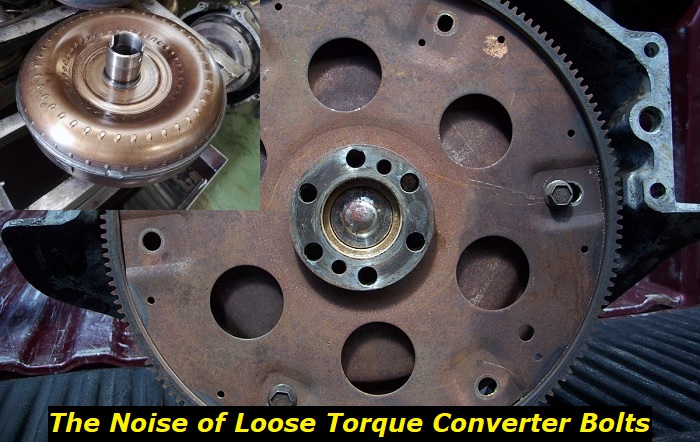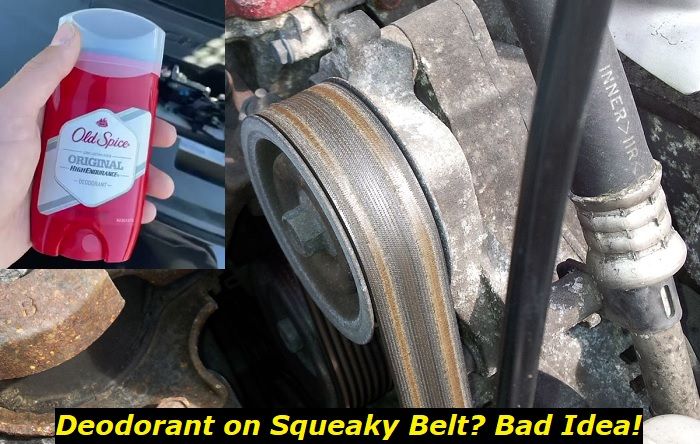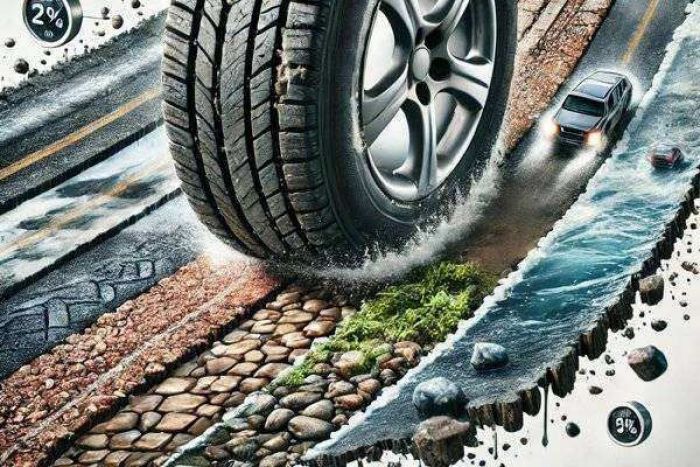Cars with an automatic transmission rely on a torque converter to provide an efficient, smooth, and enjoyable ride. Every time you shift gears, you command the torque converter to do its job flawlessly. Mechanical components sometimes fail and start throwing tantrums, like making odd noises.
Loose torque converter bolt problem highlights
- Level of importance:High
- Reasons:Torque converter problem, actually loose bolts
- Needed expertise:High
- Needed tools:Basic tools
- Time taken:1.5-3 hours
- Can you drive? Not recommended
- Possible issues: Torque converter damage, fatal transmission damage.

Your Torque Converter's Job
Drivers can find their vehicle's torque converter between the transmission and the engine's flex plate. It has replaced the ancient mechanical clutch fork and plate in manual transmission vehicles. A torque converter can also regulate your engine's power output by amplifying your torque at low speeds.
What Is That Noise?
A torque converted with loose bolts makes odds noises that sound like a knock con-rod or piston slap. The sound is generated by your torque converter and flex plate coming into contact repeatedly. If you detect the problem before it causes significant damage, tightening the bolts will have your vehicle running right as rain in no time.
If left unchecked, loose torque converter bolts will cause the entire component to malfunction. Once the torque converter is compromised, your transmission is next in the danger zone.
Can I Drive with a Failing Torque Converter?
It is possible, but not advisable, to drive a vehicle with an unreliable torque converter. This component significantly affects your car's drivability whenever it operates below expectations. Some of the effects of a malfunctioning torque converter can expose you to significant and unnecessary risks.
Prudent drivers get their cars checked out by trustworthy and certified mechanics as soon as they notice a failing component. Scheduling a diagnosis as soon as the problem manifests saves you money and transmission problems down the road.
Signs your Torque Converter is Failing
Whenever your torque converter is not functioning optimally, your car's engine will have to work harder to maintain performance. Your fluid pressure and fuel economy will increase because your engine requires more RPMs to operate effectively. Here are the most common signs of a failing torque converter.
1. Your Car's Transmission Fluid is Contaminated
Your torque converter is a fluid and hydraulic coupler that relies on clean and high-quality transmission fluid to function correctly. When your transmission fluid gets contaminated, all the components in your car that rely on it to work smoothly will be affected. If the above signs accompany your transmission fluid's contamination, your torque converter is likely malfunctioning.
Grit and grime in your transmission fluid often indicate severe torque converter damage. It would be best to consult an experienced mechanic for a professional diagnosis.
2. Your Car Has Delayed or Soft Gear Shifting
The soft or delaying gear shift is the most common sign of a failing torque converter. The trouble shifting gears is caused by low fluid pressure. You will notice that your car's transmission is no longer nice and crisp. You can increase the output pressure of your torque converter by increasing the engine's rpm to enable efficient shifting. If you notice this problem, it is advisable to schedule an appointment with your dealership or a reputable auto repair shop.
3. Your Car Vibrates or Shudders at Low Speeds
If your car has been shaking or vibrating while driving at speeds lower than 45 mph, your torque converter is likely acting up. The sensation in the passenger cabin may be as if you are driving on a bumpy country road. Usually, the vibrations need to be more consistent. The shudders are likely to come and pass suddenly, usually when you achieve a high speed.
Check if your vehicle has enough transmission fluid, as shudders are typically caused by insufficient fluid levels or the use of incorrect transmission fluid.
4. Your Car Hesitates or Jerks Forward Erratically
A malfunctioning torque converter is likely to suffer inconsistent output pressure. These pressure fluctuations may cause your throttle to malfunction. The jerking and hesitation are very dangerous and could cause you to get into a road accident. If you notice this problem, it is advisable to park your car and have it towed to the dealership or a certified mechanic for diagnosis and repair.
5. Your Vehicle's Transmission is Slipping
Inefficient transmission fluid management is a significant consequence of torque converter malfunction. Your damaged torque converter will send more or less transmission fluid than your system requires-the improper amount of transmission fluid results in gear slippage and low acceleration. If you notice that your transmission is slipping, has low oil levels, and decreases fuel economy, chances are high that a damaged torque converter is behind your troubles.
6. Your Vehicle Makes a Rattling or Whining Noise
Most drivers know their cars' sounds almost as intimately as those of their loved ones and pets. When your vehicle's torque converter fails, it will make a whining or rattling noise. Your torque converter's built-in clutch is usually the source of this noise. The noise is likely to increase when your shift to transmission gears.
7. Your Vehicle's Transmission Overheats
If your car has a temperature indicator for the transmission, you will likely receive an overheating warning. A failing torque converter causes your engine to overheat because it cannot efficiently distribute the power it generates to the transmission.
You will likely experience hard or rough shifting whenever transmission temperatures are above optimal.
8. Your Car Is Experiencing Fluid Leaks
Defective torque converter seals usually cause fluid leaks between the engine and transmission. Your converter seals may be affected by a number of factors. A mechanic will quickly identify the reason behind your torque converter's failure. Loss of transmission fluid will affect how your car transfers engine power to the transmission.
Common Problems That Cause Torque Converter Failure
Torque converters can malfunction for a variety of reasons. Here are the most common:
- Your Torque Converter Seals Are Failing
Any damage to your torque converter seal could cause transmission fluid to leak. This leakage will affect the torque converter's failure to transmit power from your energy to the transmission. This will cause many symptoms mentioned above, including slippage, overheating, and stalling.
- Your Torque Converter Clutch Solenoid is Defective
A converter solenoid plays the crucial role of detecting the fluid pressure and regulating how much fluid your clutch lockup receives. A defective solenoid will not accurately measure the amount of transmission fluid needed. This affects proper pressure regulation.
- Your Torque Converter Clutch is Damaged
Your car's torque converter clutches should lock your transmission and engine into direct drive. When the clutches malfunction, your torque converter may make your vehicle remain in gear. If the friction surface on your clutch plate is worn out, your converter may also lock in a direct drive.
- Your Needle Bearings Are Defective
Torque converters rely on needle bearings to separate the turbine, stator, impeller, and housing. The failure of needle bearings may cause strange sounds when driving. These noises are generated with metal chips accumulate in your transmission fluid. The metal chips are due to your metallic torque converter components undergoing metal-on-metal contact.
Cost of Replacing Your Torque Converter
It may be cheaper to replace your torque converter in certain situations than repair it. If you fail to repair the problem or replace the converter, your vehicle will inevitably suffer transmission problems. These costs are national estimates and vary depending on your car's model, geographical location, and mechanics' skill level.
Most torque converters are in the price range of $150 to $300. DIYers with a complete toolset and advanced skills can repair or replace their torque converters using about $150 to $500. Often replacing the converter is cheaper than fixing the problem. Ensure you weigh the costs before settling on a repair or replacement job.
Since torque converter repair and replacement is a long and tiresome task that can take between five and ten hours, the labor costs are pretty steep. Torque repair and replacement professionals charge between $600 and $1000 for efficient, warranty-backed services.
Conclusion
The best way to avoid dealing with torque converter problems is to look for the telltale symptoms highlighted above. Once you spot these signs, be sure to get your vehicle diagnosed and repaired by a professional as soon as possible. Remember that failing to fix your torque converter sets the stage for significantly expensive transmission problems.
About the authors
The CarAraC research team is composed of seasoned auto mechanics and automotive industry professionals, including individuals with advanced degrees and certifications in their field. Our team members boast prestigious credentials, reflecting their extensive knowledge and skills. These qualifications include: IMI: Institute of the Motor Industry, ASE-Certified Master Automobile Technicians; Coventry University, Graduate of MA in Automotive Journalism; Politecnico di Torino, Italy, MS Automotive Engineering; Ss. Cyril and Methodius University in Skopje, Mechanical University in Skopje; TOC Automotive College; DHA Suffa University, Department of Mechanical Engineering






Add comment